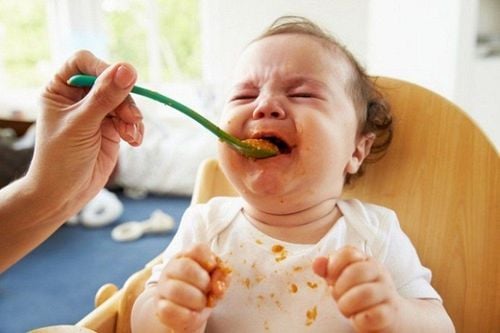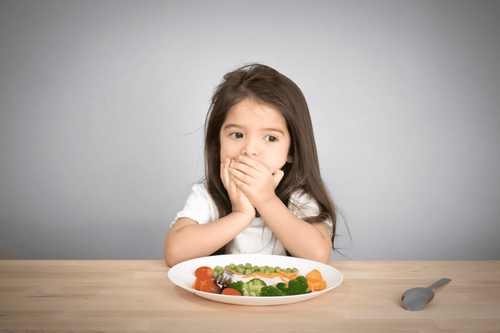This is an automatically translated article.
Anorexia (loss of appetite) is a very common condition in children, especially children who are forced to eat. Children with anorexia due to being forced to eat have symptoms such as eating less than usual, holding food in their mouth for a long time and refusing to swallow... However, not all parents know what to do when their child is anorexic because of this condition. This occurs for many reasons.1. Why do parents force their children to eat?
Here are some reasons why parents force their children to eat a lot:To complete a meal: Most of us think that when all the dishes are served, they need to be consumed. However, adults inadvertently bring that thinking to children. But with children, this is not the case because they only eat as much food as their stomach allows. When starting solid foods: This is a very common baby mistake that parents make when starting solids for the first time. The purpose of weaning is not to force your baby to eat foods she doesn't like, but to let her develop her taste buds and then let her choose what she likes. Worry about children not eating enough: Young children eat little but often eat. Our parents think that their child may not eat or get enough nutrition from small meals, hence overfeeding. Feed your baby even when the child is an adult: Many parents like to feed their children even when they are old enough to feed themselves because they think that their children cannot feed themselves. This leads to overfeeding. Not understanding children's needs: As parents, we think we are more aware of what our children need and the same is true for food. Therefore, when children refuse to eat, we often tend to force them to eat because we think that children have not understood their body's requirements. To introduce children to new foods: Parents often force their children to eat when they are familiar with a new fruit, vegetable or food. This thinking leads them to mistakenly believe that children need to be fed continuously in order for them to be able to perceive taste. Compare with other children: When the family has a brother, sister or a child of the same age who is gluttonous, fat, or simply someone's criticism of your child's appearance, many fathers Mothers feel that they are not doing a good job of feeding their babies and need to force their children to eat more. To inculcate good habits: Just because a certain food is healthy, doesn't mean you'll force your child to eat it. Parents often think that in order to create good eating habits, children should eat certain foods even if they do not like to eat.

Trẻ biếng ăn do bị ép ăn thường ngậm thức ăn rất lâu trong miệng
2. Harm of children being anorexic due to being forced to eat
Vomiting is the most common side effect of anorexia due to force-feeding Aversion to food and causes children to stop eating Destroys appetite in children Creates negative emotions: The child may develop feelings negative feelings and emotions towards food and even towards parents. Unhealthy eating habits Lack of control over eating habits Eating disorders: Because of uncontrolled eating, children may develop eating disorders such as anorexia, bulimia Parents' attitude to food leads to eating problems: When children are forced to eat, it can make them feel out of control and out of control of their lives, leading to self-esteem issues low weight.3. Some other reasons why children are anorexic
Nowadays, many parents still believe that by all means, they must force their children to eat all the standards in order for their children to grow up quickly. But the reality is quite the opposite, the more you force the child to eat, the more scared the child, the more anorexic, and the more sick he is.Nutritional imbalance in children who are too fat or too thin leads to many diseases such as malnutrition, obesity, and diabetes in children. According to a survey by the Southeast Asian Nutrition Institute (SEANUTS), up to 50% of the total children in Vietnam are deficient and are at risk of lacking essential nutrients such as vitamin A, vitamin B1, vitamin C, and vitamin C. D and iron .
Mechanism of anorexia in children is often seen:
Pathological anorexia: Because children have acute diseases such as fever, diarrhea... make them lazy to eat, eat very little or even skip meals. Physiological anorexia: Common in stages when children are learning skills such as learning to walk, learn to speak, engrossed in exploring but forget to eat Psychological anorexia: Because children do not like certain foods but their parents do not like them. do not know and continue to feed the child or even the feeder is not suitable for the child, or the eating environment is not suitable... This is also the most common reason in our country, because thinking is always afraid I'm hungry, I don't eat enough, I'm too skinny, so parents and grandparents always force the child to eat even though the child has refused, stomachache, fatigue, crying... And when the child can't do it Whatever happens, children often react against it, creating a real fight at every meal. But adults do not understand that, even themselves, there are days when they are tired, do not want to eat or simply cannot eat enough 1 bowl of rice, 1 bowl of vegetables, half a bowl of meat, fish, etc. eggs okay. Yet they go and force a child to eat enough, eat all their rations.

Trẻ biếng ăn do bị ép ăn là tình trạng thường gặp ở trẻ nhỏ
Basically when a baby is born, they themselves have a mechanism to know what they need to feed and how much to scrape. It is the job of parents to provide their children with a variety of foods that are full of nutrients. You force your child to eat only makes the child have a nutritional imbalance worse due to the inborn inability to balance himself. Children will be afraid to eat but skip eating or eat too much, leading to severe consequences such as anorexia, obesity due to binge eating or more severe depression.
Therefore, force-feeding an infant, toddler or older child can lead to a variety of physical, emotional, and physiological problems. So it's important to understand why you're forcing your child to overeat and look for possible causes of the behavior. If you feel that your child eats less than his siblings, refuses to eat, is more absorbed in playing than eating and so on, that's completely normal. You should stay calm, not panic.
If your child is a picky eater, the first thing you need to do is identify its root cause. This will help you deal with the situation in a better way. Even if your child is engrossed in something and misses his meal, it's best to leave him alone and wait until he's hungry. Remember that each meal should last only 30 minutes. Don't worry, the number of children born with anorexia and no need to eat is very small. The amount of food and nutrients that are lacking can be supplemented by the child at later meals or with other complementary foods.
In addition to being a good role model, letting your child decide his mealtimes, preferences, and other factors can go a long way in helping him form eating habits. It is important to feed your child healthy foods.
Besides, the baby should also be supplemented with necessary micronutrients such as: Zinc, selenium, chromium, vitamins B1 and B6, ginger, acerola fruit extract (vitamin C),... to improve taste , eat well, reach the correct height and weight, and exceed the standard, have a good immune system, enhance resistance to less sickness as well as less digestive problems. The improvement of symptoms can take place for a long time, so it is recommended that parents be calm and persistent when supplementing with nutrients for their children, either through food or functional foods. In particular, the use of functional foods should choose those of natural origin that are easily absorbed, do not allow simultaneous use of many types or continuously change the types of functional foods.
To have more knowledge about taking care of children by age, you should regularly visit the website vimec.com and make an appointment with the leading doctors, Pediatricians - Nutritionists when you need advice.













